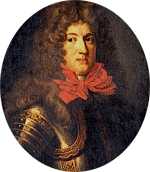Comte de Tourville

Fransk admiral.
- Beachy Head, 1690
- La Hogue, 1692
- Lagos I, 1693
TOURVILLE, ANNE-HILARION DE COTENTIN (or Cos-TANTIN), COMTE DE (1642-1701), French admiral and marshal of France, was the son of Cesar de Cotentin, or Costantin, who held offices in the household of the king and of the prince of Conde. He is said to have been born at Tourville in Normandy, but was baptized in Paris on the 24th of November 1642, was commonly known as M. de Tourville, and was destined by his family to enter the Order of Malta. From the age of fourteen to the age of twenty-five, he served with the galleys of the Order. At that time the knights were still fighting the Barbary pirates of Algiers and Tunis. The young Anne-Hilarion is said to have been distinguished for courage. His life during these years, however, is little known. The supposed Memoirs bearing his name were published by the Abbe de Magron in the i8th century and belong to the large class of historical romances which professed to be biographies or autobiographies. In 1667 he was back in France, and was incorporated in the corps of officers of the French Royal navy which Louis XIV. was then raising from the prostration into which it had fallen during his minority. The positions of French naval officer and knight of Malta were not incompatible. Many men held both. The usual practice was that they did not take the full vows till they were in middle life, and had reached the age when they.were entitled to hold one of the great offices. Until then they were free to marry, on condition of renouncing all claim to the chief places. As Anne-Hilarion de Cotentin married a wealthy widow, the marquise de Popeliniere, in 1689 at which time he was made count of Tourville, he severed his connection with the Order. Nor does he appear to have served with it at all after his return to France in 1667. He was at first employed in cruising against the Barbary pirates and the Turks. In the expedition sent against Crete in 1668-69 under command of the Due de Beaufort he had command of the " Croissant" (44). The Due de Beaufort was killed, and the expedition was a failure. When the war with Holland in which France and England acted as allies began in 1670, Tourville commanded the " Page " (50), in the squadron of the comte d'Estrees (1624-1707) sent to co-operate with the duke of York. He was present at the battle of Solebay (June 7, 1672), and in the action on the coast of Holland in the following year, when Prince Rupert commanded the English fleet. When England withdrew from the alliance, the scene of the naval war was transferred to the Mediterranean, where Holland was co-operating with the Spaniards. Tourvillle served under Abraham Duquesne in his battles with De Ruyter. He particularly distinguished himself at the battle of Palermo on the 2nd of June 1676. By this time he was known as one of the best officers in the service of King Louis XIV. Unlike many employed by the king to command his ships in the earlier part of his reign, Tourville was a seaman. He had the reputation of being able to do all the work required in a ship, and he had made a study of naval warfare. The great treatise on naval tactics afterwards published under the name of his secretary, the Jesuit Hoste or 1'Hoste, was understood to have been inspired by him. In 1683 he was chef d'escadrerear admiral with Duquesne in operations against the Barbary pirates, and he continued on that service with D'Estrees. By 1689 he had been promoted lieutenant-general des armees navales, and was named vice-admiral du Levant or of the East. In June of that year he took up the commandership-in-chief of the French naval forces in the war against England and her continental allies which had begun in the previous year. From this time till the failure of his resources compelled King Louis XIV. to withdraw his fleets from the sea, Tourville continued to command the naval war in the Channel and the Atlantic. His conduct and example during this period were the source of the system of manoeuvring to gain an advantage by some method